Contributors: Rachel Jamison and Aaron Yeager.

The upcoming August election will determine if Ohio’s Issue One will pass. Vote NO to protect the precedent of “one person, one vote,” reproductive freedoms, and our right to determine the future.
Table of Contents
What do I need to know?
- The Special Election is on August 8, 2023
- Issue One is the only issue on the ballot
- Vote NO to protect “one person, one vote”
- Issue One will make it harder for citizen-initiated constitutional amendments to pass
- Issue One will make it harder to protect reproductive rights
- This is a special election for special interests
Important dates
- July 11: Early in-person voting begins, at the Summit County Board of Elections
- July 11: Absentee voting by mail begins
- August 8: ELECTION DAY — polls open from 6:30 a.m. to 7:30 p.m.
Voting information
- Request an Absentee Ballot
- The deadline to request an absentee ballot is seven days before Election Day.
- Find Your Polling Location
- Check Your Voter Registration
What is Issue One? Why should I vote NO?
A special election will be held on August 8, 2023 with only one issue on the ballot, Issue One, which proposes amending the Ohio Constitution to require a 60% majority from voters to approve any future constitutional amendments. If passed, Issue One would make it harder for citizens to change the state constitution.
Currently, the Ohio Constitution requires a simple majority (50.01%) to approve constitutional amendments. If Issue One passes, future amendments will need to reach 60% – that means 40% of voters can veto the will of the majority on any issue.
“If Issue 1 passes, future amendments will need to reach 60% – and that means any future “NO” effort, only needs to hit 40%+1 of the popular vote. When one side has to get to 60% and the other side only needs to get to 40% that shakes out to every NO vote being worth 1.5 YES votes”
Collin Marozzi, Deputy Policy Director, ACLU Ohio
Voting NO on Issue One will preserve the vital principle of majority rule, and the “one person, one vote” precedent.
In addition to raising the required majority for approval, Issue One would make it harder for citizen-initiated constitutional amendments to pass by:
- Requiring campaigns to collect signatures in each of the state’s 88 counties, an increase from the previous 44 county requirement
- Eliminating the 10 days grace period for campaigns to gather additional signatures for when the original submission did not have enough valid signatures
Why is this vote in August? A special vote for special interests
Special interests and out-of-state funders poured millions of dollars into getting Issue One on a special ballot in an August election. Why? August elections have historically low voter turnout, making it easier to control the result.
The timing isn’t a coincidence. Back in March, Ohio Republican Senator Matt Huffman, stated it’s worth spending millions to get Issue One on the ballot in August to keep other ballot initiatives expected later this year from passing (like initiatives regarding reproductive rights, including abortion).
Those in support of Issue One say it’s currently too easy for citizens to propose constitutional amendments. However, according to The Columbus Dispatch, the General Assembly has proposed 156 of the total 227 constitutional amendments since 1913, meaning almost 70% of all constitutional amendments have come from the General Assembly. Citizen-led initiatives only make up 71 of the 227 amendments, and only 19 of those 71 amendments passed.
Issue One would shift more power away from citizens and to the General Assembly. With Ohio’s history of corrupt politicians and gerrymandering, Issue One would open the door for an increased influence of outside money and special interests.
Implications for important issues
The implications of a 60% majority requirement become even more significant when we consider the types of issues addressed through constitutional amendments. Matters such as reproductive freedom, redistricting reform, marijuana legalization, fair wages, and others of great importance and far-reaching consequences often require constitutional amendments. By imposing a higher threshold, Issue One threatens to limit the ability of the majority to address these critical matters through the democratic process.
This is especially important, considering the other ballot initiatives that are expected later this year: one ensuring the right to reproductive freedom, including abortion, and another legalizing the cultivation, sale and purchase of marijuana for recreational purposes.
In the wake of the decision overturning Roe v. Wade in 2022, voters in five states where amendments regarding abortion rights were on the ballot made the clear decision to protect reproductive freedoms. In four of those states, the proposed amendments received between 52% and 59% of the vote. Results from a poll conducted last October found that 59.1% of Ohio voters supported amending the state constitution to keep abortion legal in the state.
It’s no coincidence that Issue One is proposing a required 60% majority from voters to approve any future constitutional amendments.
Get to the polls on August 8 — your rights depend on it.
On August 8, 2023 voters will face a critical decision regarding the future of the state’s constitutional amendment process. The decision on Issue One carries immense importance. Vote NO on Issue One to protect majority rule and the principle of ‘one person, one vote.’ Vote NO on Issue One to protect our right to determine our futures and keep them out of the hands of special interest lobbyists and corrupt politicians.
Learn more about Issue One and its implications:
- https://www.acluohio.org/en/news/top-5-reasons-vote-no-issue-1-august-8th-0
- https://www.ohiocitizen.org/voteno_august
- https://votenoinaugust.org/
- https://ballotpedia.org/Ohio_Issue_1,_60%25_Vote_Requirement_to_Approve_Constitutional_Amendments_Measure_(2023)
- https://signalcleveland.org/everything-you-need-to-know-about-the-august-vote-on-issue-1/

